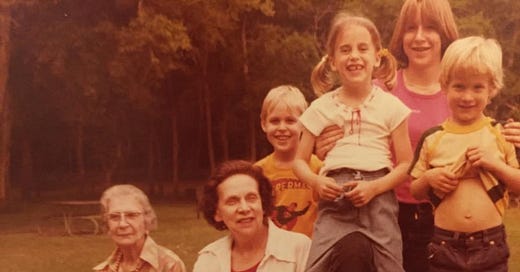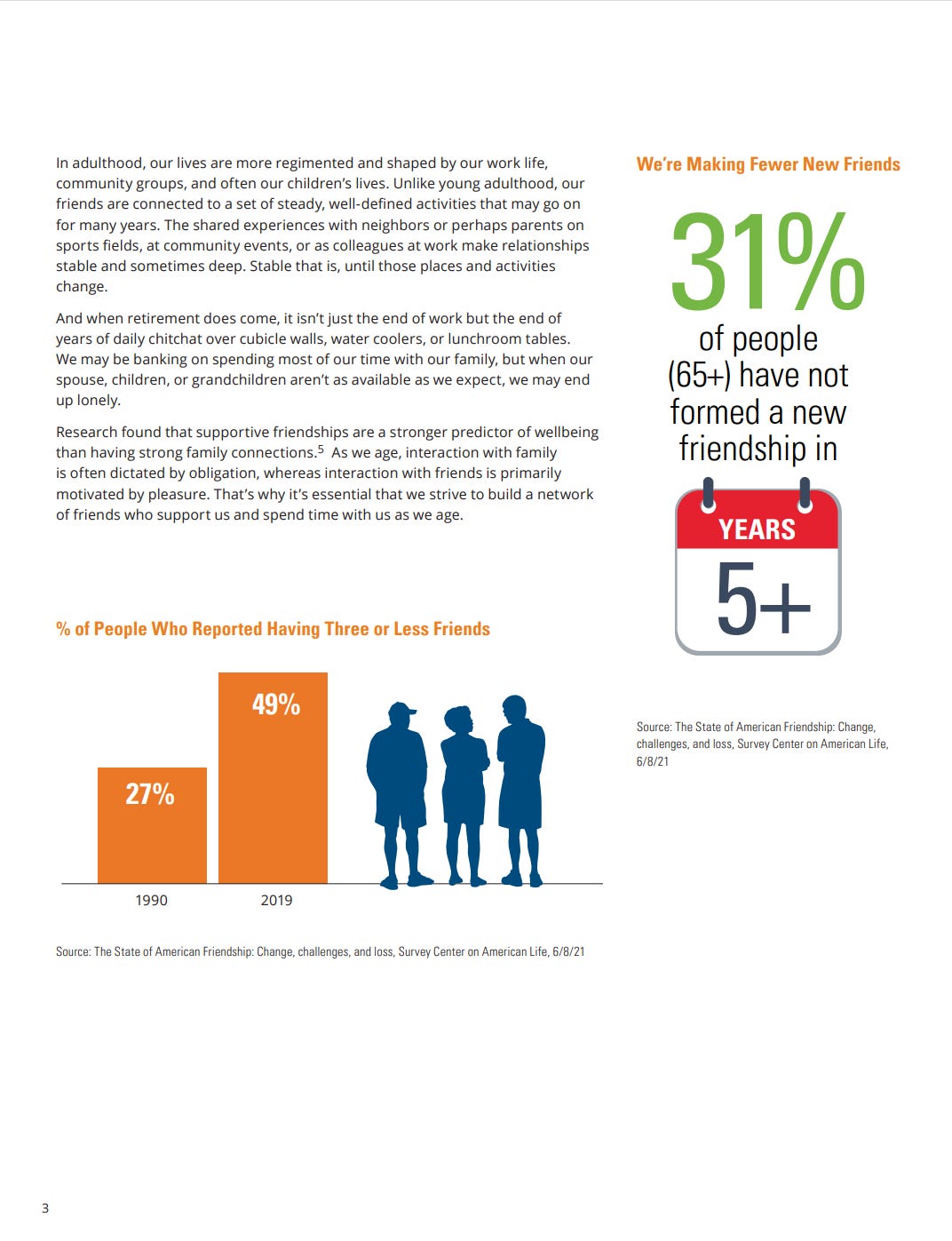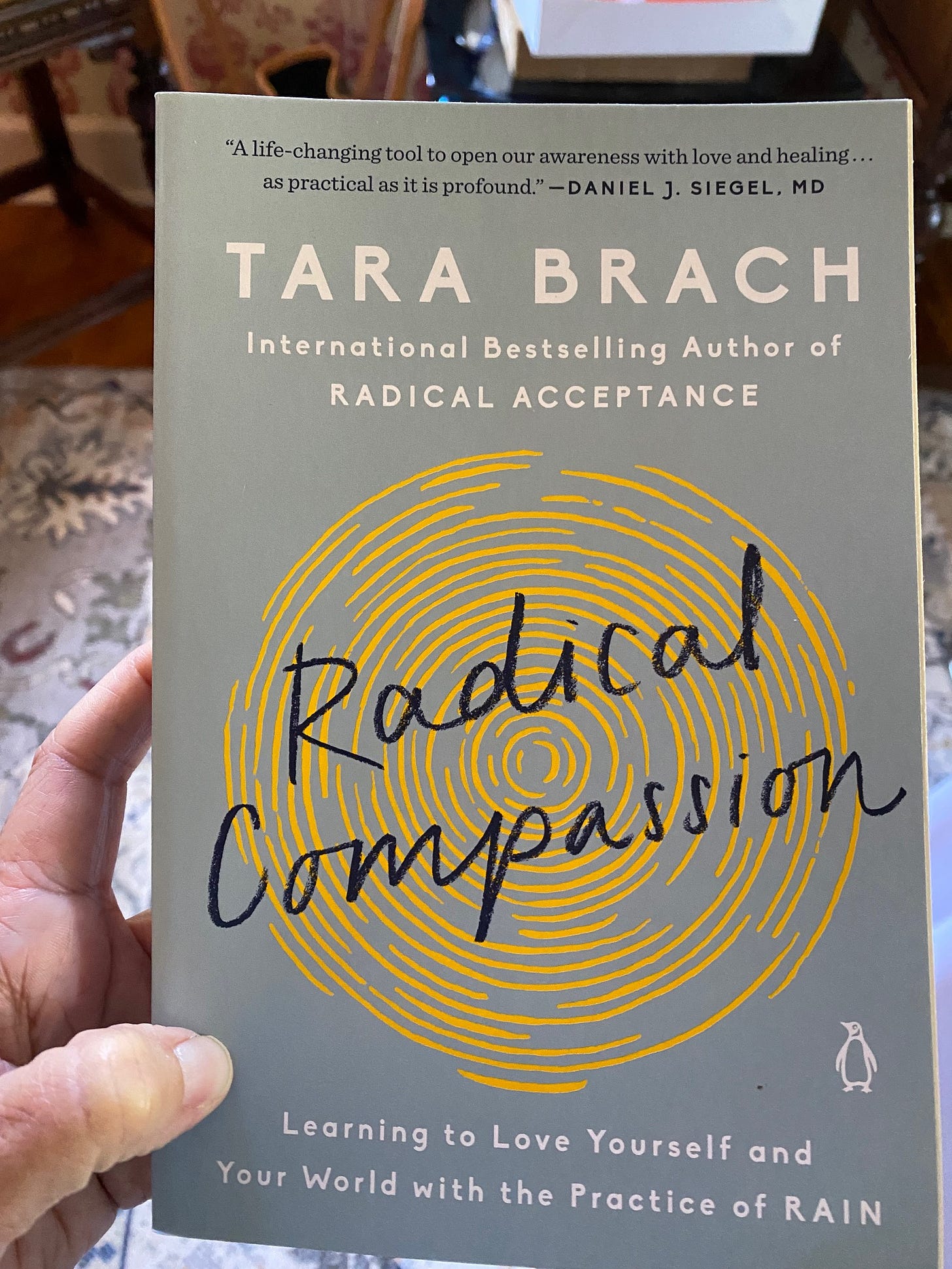Grand Plans: March 28, 2024
A semi-monthly newsletter from Grand Plans designed to normalize and celebrate our glorious geri-destiny through information, stories, real talk conversation, smart planning and shared experience.
Things I’m prattling on about today
What do we think about the importance of embracing multigenerational roles in our families and communities today? Are we emphasizing it enough? Too much? Could we be leaning into relationships with grand younger and older loved ones a little more? Or less?
The answers to these questions are "in my opinion, it's pretty darn important," yes, yes, yes and yes.
As I see it, American families several generations back (think the Walton or Ingalls families) were sharing the duties of work, child-rearing, life support and positive influencing. Everyone had a role to play, and often families lived in the same household. Then people started living longer, and working harder and achieving bigger and moving away further all of a sudden the American family/community is comprised of individual folks with individual goals living their own individual experience in their own individual corners of the universe. From my perspective, our society seems to value personal independence and success over multigenerational teamwork, and I think that's a tragedy -- a missed opportunity that is making the aging experience harder (and more destabilizing and expensive!) for adults of every age and stage in a family. Have we taken the grand out of grandparenting?
It's hard to say. Only a very small fraction of the people to whom I've been close in my life have co-parented with or depended on older family members (and vice-versa) during their child rearing experiences and even fewer have embraced a the multigenerational household model. Instead, the relationships I've seen are based more on fraternity and fun than they are on function. More levity, less leaning-on. And while it may sound like #winning to stay on the periphery and observe to "somebody else's" circus from a safe distance, it actually might be a big loss.
Here's why: when humans of any age assume a family role, they have purpose. It's like getting a refuel! For us older adults, purpose helps us fire on all cylinders -- it juices us up emotionally, cognitively and physically. That's why having it is one of the big pillars of aging. Socializing, being part of community and continuing to learn are also important tenets -- which, hello!, you can totally flex when you're a key person on your family's team. Grandparents also have the unique opportunity to share strengths, lessons and experiences with younger family members and "pass on" valuable insight that can change a trajectory. For younger folks, including those in caregiving relationships with older loved ones, this role is an opportunity to learn, sharpen new abilities and engender a passion for service. And on both ends of the spectrum, everyone is winning because everyone is saving BANK in babysitting, carpooling, caregiving, errand-running, bill-paying, life-managing and the like.
It seems like a win-win to me. But I may be in a league of my own here. As a motherless mother whose father did grand-living elsewhere, I have a limited perspective. My grandmother didn't live with us, but she convalesced at our house from time to time and would come for long visits and cook us goulash and bring us fresh socks from Bill's Dollar store. We spent most weekends at our Farm with my mom's parents and went on fun bougie trips with them on occasion. Both sets were called in for service on an as-needed basis only. But both managed to squeeze in some church or sewing lessons or "how to not love to cook" classes during their "on-times." And both passed down their love of bad television and the nightly news. On the flipside, both sets chose to reside in an independent living facility near our home. So no one was saving much on the caregiving front. I sometimes wonder if life would have been any better or worse if we were more the scene for each other during my childhood. And what was happening in other households in my neighborhood back then, and ours today?
The view is murky at best. On one hand, a 2020 Pew Research study shows "nearly four-in-ten older adults around the world live with extended family and those in the U.S. rarely do," while another Pew study from 2022 indicates that between 1971 and 2021, "the number of people living in multigenerational family households quadrupled...reaching 59.7 million in March 2021" with the share more than doubling to 18 percent of the population. That's a lot of folks who depend on older or younger family members to get by in life.
And this group is growing. According to a recent CBS News story, a Harris Poll for Bloomberg finds "45 percent of people ages 18 to 29 are living at home with their families — the highest figure since the 1940s." These 20-somethings are moving in with their families for the same reasons older folks do during their Golden Years -- to save money and cut down on expenses.
At the same time, I don't really want my adult kids to live with me too long, and I'm not sure how I'd feel if I had parents and they wanted to age in my place. I like my personal space and privacy! So maybe there's a healthy "in the middle" space where we can understand the importance of playing a key role in our families’ lives and lean in with big love and purpose when it feels right and best to do so. Maybe that's putting the grand back in grandparenting.
News you can use
If you’re wondering what actually happens when grandparents help raise grandchildren, we’ve got you covered with this awesome article from Greater Good Magazine.
Our youngest grand yoots and family members can keep us healthy as we age, we can learn a lot from those rascals!
And they can learn a lot from us because we are older and wiser…80-year-olds share their best parenting advice and it’s spot on.
Intergenerational relationships also help us learn new things! It seems that being an avid learner is good for our longevity and health.
Loneliness has become an epidemic as we age, especially for men it seems.
Social isolation may be linked to biological age gaps.
Who’s bucking the happiness trends in our country? The grands, that’s who.
Grand Plans Podcast
Season 3 of the Grand Plans podcast is keeping on keeping on. Each episode is a conversation about four of the 20 steps of a workable Grand Plan recorded from the Grand Plans: The Workshop events, plus a few more surprises. Find it wherever you download your podcasts! Here’s a link to Season 3 Episode 4.
Geris-prudence
The American Bar Association shares a very helpful list of the 10 must-dos when you are the caregiver for a family member or friend. This must-do list is a must-read!
And here’s a story from NextAvenue.org about how to get paid for your caregiving work.
Advanced health and wellness
Award-winning researcher and author of the Wellness Discovery newsletter Heather Hausenblas PhD shared a great perspective on why it’s healthy to prioritize friendships. Enjoy her reflections and research from a recent newsletter here.
The grand sum
And here’s some information about investing in your social portfolio, the greatest investment you can make during your second half!
Shelf life
I picked up this book from the St. John’s Cathedral Bookstore & Gift Shop a few weeks ago and it looks great, doesn’t it? Who doesn’t need a little Radical Compassion? “Tara Brach is an in-the-trenches teacher whose work counters today’s ever-increasing onslaught of news, conflict, demands and anxieties — stresses that leave us rushing around on autopilot and cut off from the presence and creativity that gives our life meaning. In this heartfelt and deeply practical book, she offers an antidote: an easy-to-learn four-step RAIN meditation that quickly loosens the grip of difficult emotions and limiting beliefs.”
Shared experience
We can all learn from each other’s geri-scary moments. What are some of your takeaway lessons? What have you promised yourself you’ll never do to your loved ones? What worked for you? What didn’t? More conversation and story-sharing helps elevate the senior experience for all of us. If you want to share your grand tales, email susannabarton@me.com and I’ll put them in an upcoming newsletter.
O-bitchin’
What a beautiful memorial to this man’s late wife. Instead of writing an obituary, this longtime journalist decided to start a movement:
“But an epiphany occurred to me in the midst of my grief. Why do we wait until someone we care about passes on before we explicitly express our feelings for them? Why don't we instead express this while they are still with us? Deep down, those we care for must know how we feel. But why not tell them directly? It would be a priceless gift that would bring joy to both sides.
“At the same time, do we say thanks to those who helped us personally or professionally? Why not? The world would be a better place if we made a habit of reaching out to say so, perhaps even to people we're not in regular contact with. What a nice way to reconnect.
So, I am launching a new worldwide project titled "People Who Care." It costs nothing to join, only a determination to follow through regularly. But it will pay rich dividends—in the form of an inner glow of happiness and satisfaction. Come aboard!” Read the story here.
Some golden gedunk and goods
Get yourself another few copies of Grand Plans: How to Mitigate Geri-Drama in 20 Easy Steps and the Grand Planner for all the people who like getting gifts in your life! Visit www.mygrandplans.com for links to purchase on Amazon.
And
Check out our Grand Plans merch in our Etsy storefront.
























